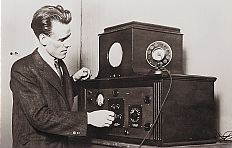1950-1959: DAYS OF CONFLICT, YEARS OF PROSPERITY
Farnsworth now recognized as TV pioneer
 |
 |
 |
 |
|
|
|
Before the big screen
Philo Farnsworth developed early TV technology in Fort Wayne in the middle of the century. |
|
|
By Doug LeDuc of The News-Sentinel
A brilliant scientist, who lived in Fort Wayne for 20 years, waged a David vs. Goliath battle over the invention of television.
David lost.
The man now acknowledged as the father of television, Philo Farnsworth, was described by The New York Times as "a reserved, slender, quiet and unassuming man tirelessly absorbed in his work. At the age of 31, he was rated by competent appraisers as one of the 10 greatest living mathematicians."
A precocious farm boy who had largely taught himself electronics and physics, Farnsworth came up with the ideas at age 14 that formed the basis for his invention of television.
His thirst for discovery was unquenchable. He dreamed of heading a research department packed with top talent, backed with unlimited funding, free to tackle any project that held his interest. He hoped his Fort Wayne TV factory would help him realize that dream.
"He said on our wedding night that we were going to be living right on the leading edge of discovery, and it was going to be very exciting. And it was," said Elma "Pem" Farnsworth, herself known as the mother of television, who still lives in Fort Wayne.
The Farnsworths' dream was never fully achieved, but the inventor worked quite autonomously at the business that today is ITT Aerospace/Communications division.
Farnsworth had founded his business in Philadelphia in 1931. He came here when he bought Fort Wayne-based Capehart, a phonograph manufacturer that had fallen on hard times during the Great Depression.
Farnsworth Radio and Television Corp. operated in Fort Wayne for little more than a decade as an independent company.
Farnsworth became embroiled in legal battles with RCA, the industry leader. The larger company's executives were out to eliminate Farnsworth and his business, Farnsworth Radio and Television Corp., as a potential threat to its dominance in consumer electronics, said Elma Farnsworth.
The electronic genius had applied for the first complete television system patent in 1927 and RCA had challenged his claim.
Elma Farnsworth worked closely with her husband on television's early development, maintaining his journal, drawing sketches of his inventions and helping to build some of the equipment.
A series of court cases in 1934 proved decisively that Farnsworth should hold the basis patents. RCA appealed and lost, but pursued other litigation, which delayed its paying royalties to Farnsworth.
"They did everything they could think of to slow him down," Elma Farnsworth said. The Farnsworths were told by former RCA employees that the competitor "had a department that was called the 'get-around-Farnsworth department,' " she said.
But the promise of commercial television was delayed by World War II.
After America joined the war, the government halted television production to divert resources to the war effort. Shortly after the war ended, Farnsworth's patents became public domain.
Farnsworth's Fort Wayne business had focused on defense electronics during the war, and found it difficult to adjust to defense spending cuts after the fighting stopped.
Meanwhile, RCA beefed up its television production and launched an aggressive public relations campaign to promote its executives as the fathers of television.
Today's manufacturer of RCA consumer electronics products -- Thompson Consumer Electronics -- may still benefit from some of the confusion the campaign caused.
As recently as last month, Thompson's Web site said RCA "introduced television at the 1939 World's Fair in New York City." It said the company spent $50 million getting to that point, and makes no mention of Farnsworth.
James Harper, a spokesman for the company, said the site does not claim RCA invented the product.
"We're not trying to take credit for anything Philo Farnsworth did; we're trying to make sure we get credit for the things we've done."
Farnsworth's Fort Wayne business at 3700 E. Pontiac St. was sold to ITT in 1949, which refocused it on defense and aerospace electronics. ITT remains among the area's largest employers.
A number of Farnsworth's engineers joined Fort Wayne-based Magnavox Co. after the sale to ITT. Magnavox started making televisions at its Bueter Drive plant in 1948.
Its TV production was transferred to Greeneville, Tenn.; Paducah, Ky.; and Jamestown, N.Y., early in the 1950s, but the engineering for Magnavox consumer electronics stayed in Fort Wayne until it followed production south in 1980.
Farnsworth was made president and technical director of ITT Farnsworth Research Corp., and a technical consultant to ITT Industrial Laboratories in Fort Wayne.
He consulted on research for missile guidance, infrared devices and special purpose vacuum tubes. And he worked extensively during the 1950s and 1960s on a project to develop nuclear fusion as a commercial power source.
Philo Farnsworth died in 1971.
The Farnsworth family says RCA tactics prevented Philo from receiving the acclaim or monetary rewards the invention should have brought him. And it has worked hard to set the record straight through media interviews and a biography of the inventor.
To some extent, they have succeeded. His accomplishments have been acknowledged by Time magazine, a public television documentary and on a U.S. postage stamp.
"We had our problems . . . He had a perforated ulcer," Elma Farnsworth said. "And Phil used to say he was sorry he had anything to do with television, because of the programs."
But when Farnsworth saw his invention being used to broadcast the U.S. moon landing, "he thought it was all worthwhile," she said. "He realized it had great potential, but (much of the time) it just wasn't being used right."